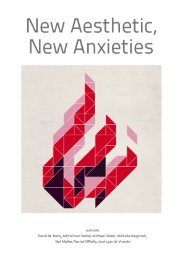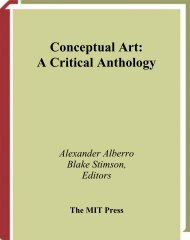You also want an ePaper? Increase the reach of your titles
YUMPU automatically turns print PDFs into web optimized ePapers that Google loves.
peculiar gesture - the impossibility of community. A community is not a project<br />
of fusion, or in some general way a productive or operative project - nor is it a<br />
project at all (once again, this is its radical difference from 'the spirit of a people',<br />
which from Hegel to Heidegger has figured the collectivity as project, and<br />
figured the project, reciprocally, as collective - which does not mean that we can<br />
ignore the question of the singularity of a 'people').<br />
A community is the presentation to its members of their mortal truth (which<br />
amounts to saying that there is no community of immortal beings: one can<br />
imagine either a society or a communion of immortal beings, but not a<br />
community). It is the presentation of the finitude and the irredeemable excess<br />
that make up finite being: its death, but also its birth, and only the community<br />
can present me my birth, and along with it the impossibility of my reliving it, as<br />
well as the impossibility of my crossing over into my death. [ ... 1<br />
Community means, consequently, that there is no singular being without<br />
another singular being, and that there is, therefore, what might be called, in a<br />
rather inappropriate idiom, an originary or ontological 'sociality' that in its<br />
principle extends far beyond the simple theme of man as a social being (the zoon<br />
politikon is secondary to this community). For, on the one hand, it is not obvious<br />
that the community of singularities is limited to 'man' and excludes, for<br />
example, the 'animal' (even in the case of 'man' it is not afortiori certain that this<br />
community concerns only 'man' and not also the 'inhuman' or the 'superhuman',<br />
or, for example, if I may say so with and without a certain Witz, 'woman': after<br />
all, the difference befween the sexes is itself a singularity in the difference of<br />
singularities). On the other hand, if social being is always posited as a predicate<br />
of man, community would signify on the contrary the basis for thinking only<br />
something like 'man'. But this thinking would at the same time remain<br />
dependent upon a principal determination of community, namely, that there is<br />
no communion of singularities in a totality superior to them and immanent to<br />
their common being.<br />
In place of such a communion, there is communication. Which is to say; in<br />
very precise terms, that finitude itself is nothing; it is neither a ground, nor an<br />
essence, nor a substance. But it appears, it presents itself, it exposes itself, and<br />
thus it exists as communication. In order to designate this singular mode of<br />
appearing, this specific phenomenality, which is no doubt more originary than<br />
any other (for it could be that the world appears to the community, not to the<br />
individual), we would need to be able to say that finitude co-appears or<br />
compears, (com-parait) and can only compear: in this formulation we would need<br />
to hear that finite being always presents itself 'together', hence severally; for<br />
finitude always presents itself in being-in-common and as this being itself, and<br />
66/ /THEORETICAL FRAMEWORKS








